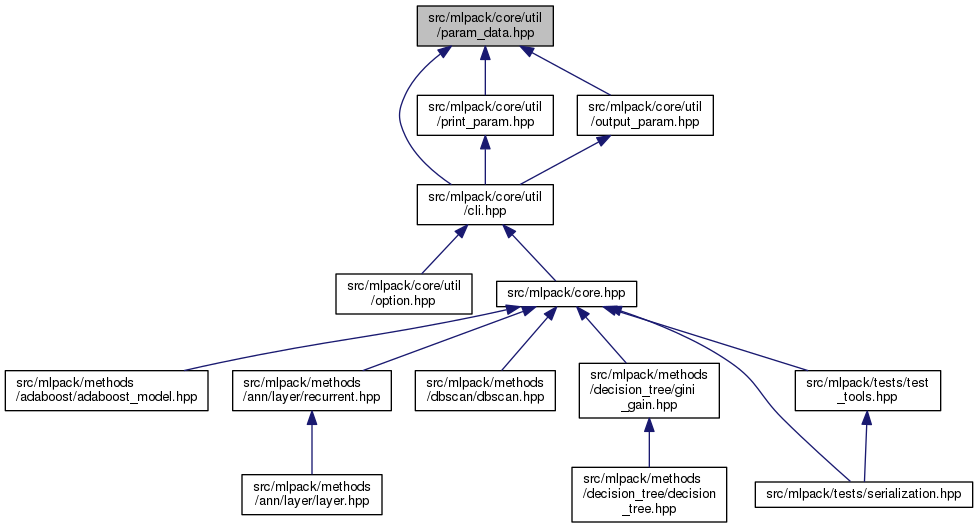|
mlpack
master
|
|
mlpack
master
|


Go to the source code of this file.
Classes | |
| struct | mlpack::util::IsStdVector< T > |
| Metaprogramming structure for vector detection. More... | |
| struct | mlpack::util::IsStdVector< std::vector< T, A > > |
| Metaprogramming structure for vector detection. More... | |
| struct | mlpack::util::ParamData |
| This structure holds all of the information about a single parameter, including its value (which is set when ParseCommandLine() is called). More... | |
| struct | mlpack::util::ParameterType< T > |
| Utility struct to return the type that boost::program_options should accept for a given input type. More... | |
| struct | mlpack::util::ParameterType< arma::Mat< eT > > |
| For matrix types, boost::program_options will accept a std::string, not an arma::mat (since it is not clear how to specify a matrix on the command-line). More... | |
| struct | mlpack::util::ParameterType< std::tuple< mlpack::data::DatasetMapper< PolicyType >, arma::Mat< eT > > > |
| For matrix+dataset info types, we should accept a std::string. More... | |
| struct | mlpack::util::ParameterTypeDeducer< HasSerialize, T > |
| struct | mlpack::util::ParameterTypeDeducer< true, T > |
Namespaces | |
| mlpack | |
| Linear algebra utility functions, generally performed on matrices or vectors. | |
| mlpack::util | |
Macros | |
| #define | TYPENAME(x) (std::string(typeid(x).name())) |
| The TYPENAME macro is used internally to convert a type into a string. More... | |
Functions | |
| template<typename T > | |
| T & | mlpack::util::HandleParameter (typename util::ParameterType< T >::type &value, util::ParamData &d, const typename boost::disable_if< arma::is_arma_type< T >>::type *=0, const typename boost::disable_if< data::HasSerialize< T >>::type *=0, const typename boost::disable_if< std::is_same< T, std::tuple< mlpack::data::DatasetInfo, arma::mat >>>::type *=0) |
| If needed, map 'trueValue' to the right type and return it. More... | |
| template<typename T > | |
| T & | mlpack::util::HandleParameter (typename util::ParameterType< T >::type &value, util::ParamData &d, const typename boost::enable_if< arma::is_arma_type< T >>::type *=0) |
| This must be overloaded for matrices. More... | |
| template<typename T > | |
| T & | mlpack::util::HandleParameter (typename util::ParameterType< T >::type &value, util::ParamData &d, const typename boost::enable_if< std::is_same< T, std::tuple< mlpack::data::DatasetInfo, arma::mat >>>::type *=0) |
| This must be overloaded for matrices and dataset info objects. More... | |
| template<typename T > | |
| T & | mlpack::util::HandleParameter (typename util::ParameterType< T >::type &value, util::ParamData &d, const typename boost::enable_if< data::HasSerialize< T >>::type *=0) |
| This must be overloaded for serializable objects. More... | |
| template<typename T > | |
| T & | mlpack::util::HandleRawParameter (typename util::ParameterType< T >::type &value, util::ParamData &, const typename boost::disable_if< arma::is_arma_type< T >>::type *=0, const typename boost::disable_if< data::HasSerialize< T >>::type *=0, const typename boost::disable_if< std::is_same< T, std::tuple< data::DatasetInfo, arma::mat >>>::type *=0) |
| This will just return the value. More... | |
| template<typename T > | |
| T & | mlpack::util::HandleRawParameter (typename util::ParameterType< T >::type &, util::ParamData &d, const typename boost::enable_if< arma::is_arma_type< T >>::type *=0) |
| This will return the mapped value. More... | |
| template<typename T > | |
| T & | mlpack::util::HandleRawParameter (typename util::ParameterType< T >::type &, util::ParamData &d, const typename boost::enable_if< data::HasSerialize< T >>::type *=0) |
| This will return the mapped value. More... | |
| template<typename T > | |
| T & | mlpack::util::HandleRawParameter (typename util::ParameterType< T >::type &, util::ParamData &d, const typename boost::enable_if< std::is_same< T, std::tuple< data::DatasetInfo, arma::mat >>>::type *=0) |
| This will return the mapped value. More... | |
| template<typename T > | |
| std::string | mlpack::util::MapParameterName (const std::string &identifier, const typename boost::disable_if< arma::is_arma_type< T >>::type *=0, const typename boost::disable_if< data::HasSerialize< T >>::type *=0, const typename boost::disable_if< std::is_same< T, std::tuple< mlpack::data::DatasetInfo, arma::mat >>>::type *=0) |
| If needed, map the parameter name to the name that is used by boost. More... | |
| template<typename T > | |
| std::string | mlpack::util::MapParameterName (const std::string &identifier, const typename boost::enable_if_c< arma::is_arma_type< T >::value||std::is_same< T, std::tuple< mlpack::data::DatasetInfo, arma::mat >>::value||data::HasSerialize< T >::value >::type *=0) |
| This must be overloaded for matrices. More... | |
This defines the structure that holds information for each command-line parameter, as well as utility functions it is used with.
Definition in file param_data.hpp.
| #define TYPENAME | ( | x | ) | (std::string(typeid(x).name())) |
The TYPENAME macro is used internally to convert a type into a string.
Definition at line 18 of file param_data.hpp.
 1.8.11
1.8.11